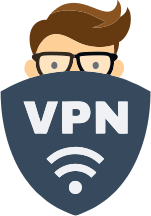VPN
A VPN (Virtual Private Network) is a great tool for helping you to protect your privacy on the web by hiding your IP address from websites that you visit and other services you use. Here’s how. When you connect to a website, the connection goes from your computer through your ISP (Comcast, Time Warner, Verizon, etc.), through a few intermediate steps until it reaches the website you want to reach. This is a direct connection to the Internet, and is what most people have. It allows the website you’re connecting to (along with every other location that your connection jumps through) to see your personal IP address. If a website, service or other entity wants to track your actions on the web, it’s very easy to do so by using this address. If, however, you use a Virtual Private Network , then the connection out to the web is much different.

VPN
Once your connection reaches your ISP, it routes to the VPN before traveling out to the website that you want to visit. The website or service that you’re connecting to seize the connection as coming from the VPN, not your personal computer, and thus can’t associate the visit with your computer’s IP address. Many public Virtual Private Network services use what are called shared IP addresses, which means that everyone who uses the Virtual Private Network appears to be using the same IP address when they connect out to the web. With so many different connections coming from the same IP it becomes nearly impossible to track people as they browse across the web, since all of the connections appear to be coming from the same location. VPNs have another benefit related to where in the world you’re physically located.
Many services use geolocation (where you are in the world) to restrict what content you can read, watch and listen to. Some videos on YouTube, for example, can only be viewed by people inside the USA. These types of restrictions are done in real time based on the IP address of the visitor, which can be used to tell what country, state and city you’re in. Because a VPN effectively hides your home IP and makes it appear as though you’re accessing the Internet from the IP address of the VPN, you can access geography-restricted content by accessing the content through a VPN that has an IP address in the appropriate country.
For example, if you live in Mexico and wanted to view a video that’s restricted to USA residents, you could connect to a USA VPN and then view the video, because as far as the video service is concerned, you are a USA resident due to your IP address being that of the VPN. My two favorite VPN providers that have IP addresses in multiple countries across the world are Safer VPN and Strong VPN. I use both services and have had a great experience with both, so it’s up to you to decide which one you want to use based on what each service provides and the differently-priced packages they offer. If a VPN sounds like something that would be useful to you, I would encourage you to check out these and other VPN services on your own to see what they have to offer.
I hope that you understand my post. if you like this post then share my post, and comment on my post if you have any suggestion or Queries related to vpn. Thank you!




